
Information about the adoption of the euro
Important information
All funds in accounts are automatically converted free of charge at the official exchange rate of 1.95583 BGN per EUR. All card payments are now in EUR, and only EUR can be withdrawn from ATMs.
Until January 31, 2026, only BGN can be deposited at DSK Bank ATMs with a deposit function, free of charge.
Until January 31, 2026, payments can also be made in BGN, but only in cash.
Until June 30, 2026, anyone can exchange EUR banknotes and coins free of charge at any bank or Bulgarian Post Office at the official exchange rate.
We accept coins sorted by nominal value.
You can exchange BGN for EUR at any DSK Bank branch, except for cashless branches. For amounts over 30 000 BGN, a standard advance request of three business days is required.
If you are not yet a customer of DSK Bank and are planning to visit an office, you need to prepare documents. You can become our customer and use our mobile app to manage your finances easily and conveniently.
The BNB exchanges BGN banknotes and coins into EUR free of charge, in unlimited quantities and without time limits, at the official exchange rate.
Until January 31, 2026, only BGN can be deposited at DSK Bank ATMs with a deposit function, free of charge.
What euro banknotes look like
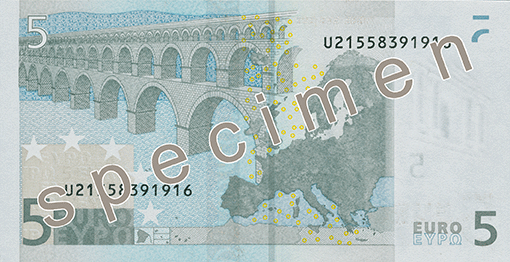
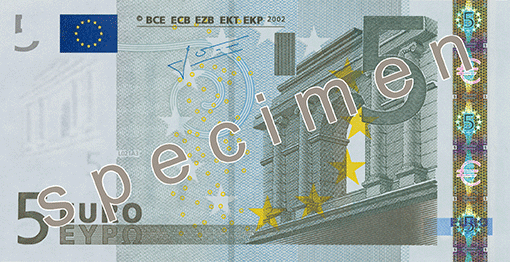
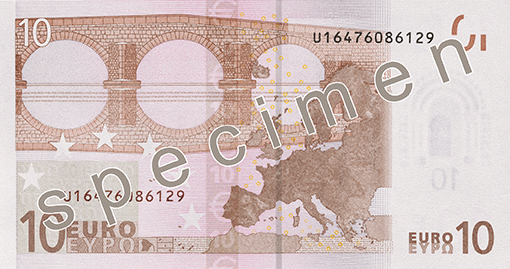
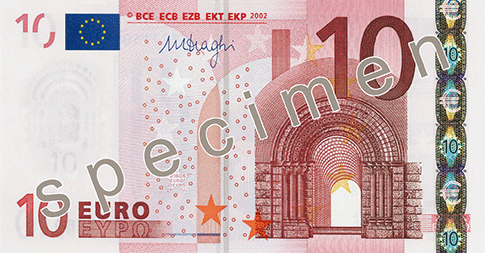
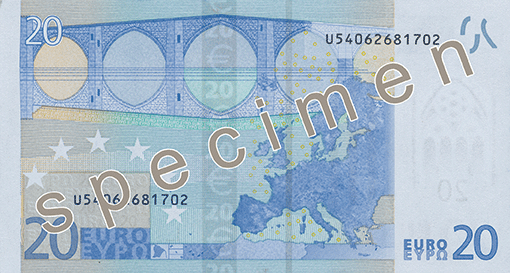
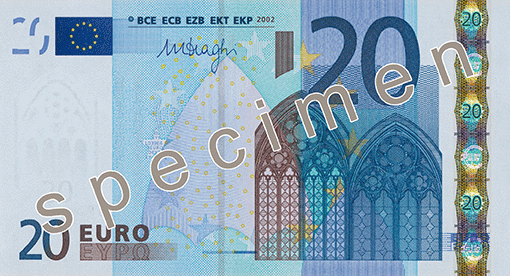
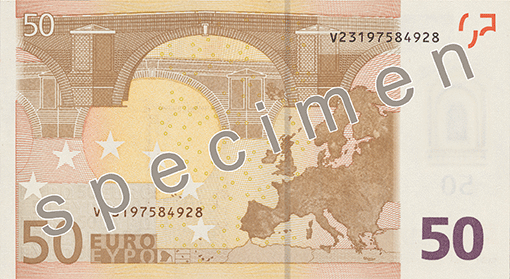
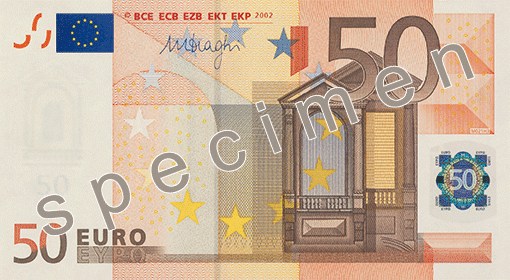
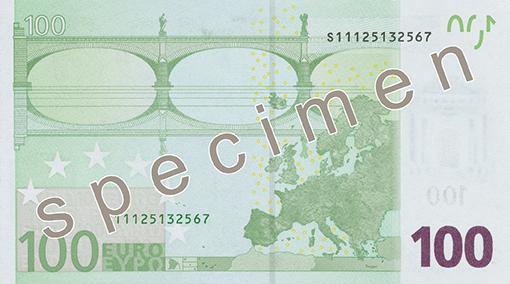
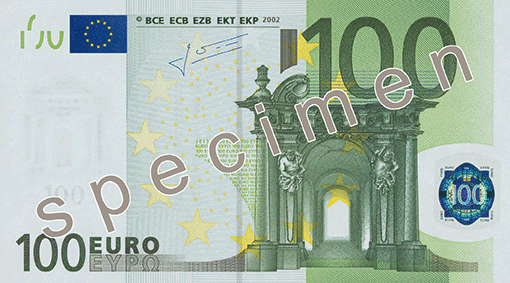
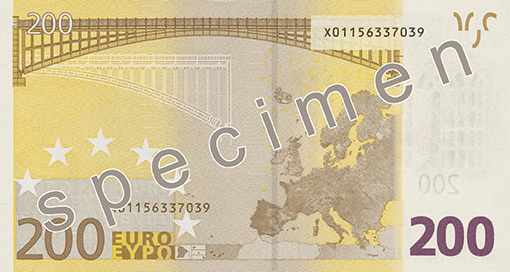
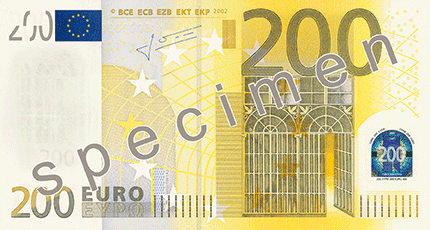
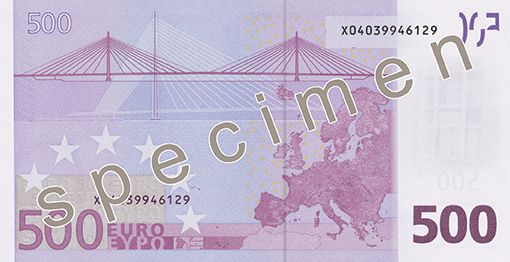
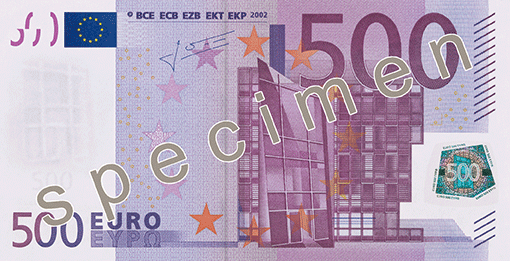
What euro banknotes look like
The euro coins have a common front side and a national back side. The national side indicates the issuing country. Nevertheless, national specific, all of coins can be used to pay in each country member of the Eurozone. The main elements of the design of the national side of the Bulgarian euro coins reproduce the design of the current Bulgarian coins in circulation: the Madara Horseman – on 1, 2, 5, 10, 20, and 50 euro cent coins; St. Ivan Rilski – on 1 EUR coins; Paisiy Hilendarski – on 2 EUR coins, corresponding to the same images used on the current leva coin nominals. Тhe word “евро” (euro) is written in Cyrillic on the 1 EUR and 2 EUR coins. The 1 cent coin bears the word “стотинка” (stotinka), while the 2, 5, 10, 20, and 50 cent coins display “стотинки” (stotinki).
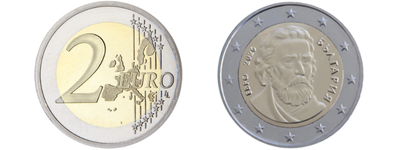
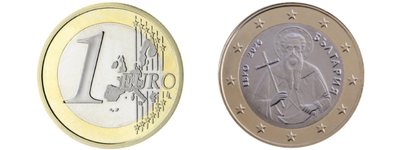
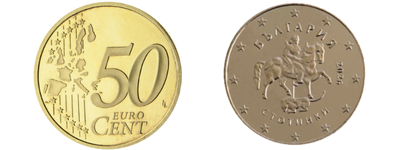
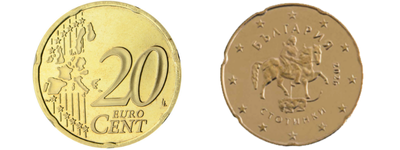
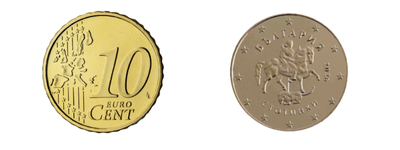
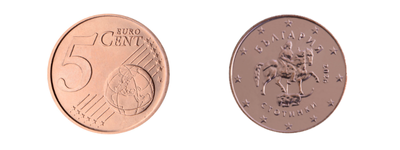
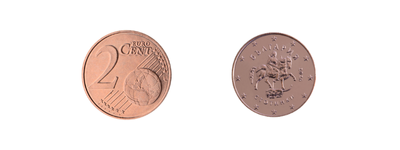
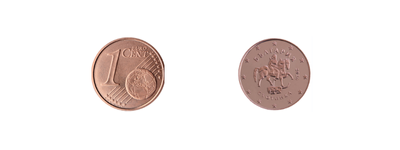
Source of images of the common side of the euro coins: ECB
Frequently Asked Questions
The euro will be adopted as the official currency of Bulgaria on January 1, 2026. On July 8, 2025, the final two steps for the introduction of the euro in Bulgaria became a fact. The European Parliament endorsed our accession to the euro area, and the EU Council adopted the decision for Bulgaria to join the euro on January 1, 2026. The exchange rate between the lev and the euro was also confirmed – 1.95583 leva for 1 euro. Earlier, on June 4, the European Commission and the European Central Bank confirmed in positive reports that Bulgaria is ready to become the 21st member of the euro area.
Bulgaria will adopt the euro at the fixed exchange rate of 1.95583 leva for 1 euro. This same rate is well known by Bulgarin citizens remaining fixed since more than 25 years.
The official exchange rate of 1.95583 BGN = 1 EUR is not subject to rounding. Rounding applies only to the final amount in euro, and only to the second digit after the decimal point (euro cents).
How does rounding work?
- If the third decimal digit is less than 5, the second digit stays the same.
- If the third digit is 5 or greater, the second digit is rounded up by one.
Here are two specific examples:
- If you have 10,000 BGN in your account:
10,000 ÷ 1.95583 = 5,112.919 EUR
→ Final amount: 5,112.92 EUR (the third digit is 9 → rounds up)
- If your monthly loan payment is 865 BGN:
865 ÷ 1.95583 = 442.252 EUR
→ Final amount: 442.25 EUR (the third digit is 2 → remains unchanged)
Several months prior to the official introduction of the euro, prices of goods and services will be shown to consumers in both leva and euros. Dual price display must begin no later than one month after the EU Council’s decision to adopt the euro in Bulgaria, i.e., by August 8, 2025. This also applies to banking products and services — in DSK Bank’s online and mobile banking, as well as in certain documents, you can now see amounts in both currencies. When withdrawing from a DSK Bank ATM, the printed receipt already shows amounts in both leva and euros. The tariff for fees and commissions applied by DSK Bank for individuals is now presented with dual pricing – in leva and euro – for all active products and services as of July 1, 2025. Fees in the tariff applied by DSK Bank have been presented in leva to euros at the fixed exchange rate, with no alteration to their amounts. After the introduction of the euro, the tariff will continue to be displayed with dual pricing (euros and leva) for an additional 12 months –until December 31, 2026.
Yes. For one month after January 1, 2026, both leva and euros in cash can be used at Merchant locations simultaneously – this is known as the dual circulation period. During this month, payments in leva will be possible only in cash, while all online payments and bank transfers will be made exclusively in euros. When you withdraw cash from an ATM, you will receive euro banknotes only. Till January 31, 2026 you will be able to spend for any purchases at shops (which accept cash) your pocket leva remained from previous period. During this transition period, merchants are required to give change only in euros. They may return change in leva only if they do not have enough euros available at the time.
If you have lev cash savings, it is recommended to deposit them into your bank account before January 1, 2026. This is the safest and most convenient way to prepare for the upcoming switch to the euro. From August 1 to December 31, 2025, DSK Bank’s individual clients can deposit BGN cash into their personal accounts without a fee – either at a branch counter or with debit card at an ATM with deposit functionality. Thus, on January 1, 2026, when Bulgaria adopts the euro, these funds will be automatically and free of charge converted into euros. The campaign does not include coin deposits or deposits made by third parties.
If on January 1, 2026, you still have any cash in Bulgarian leva, you will be able to use it for one more month — until January 31, 2026 — for any purchases at retail outlets, shops, or other places that accept cash payments (such as municipal tax offices, etc.).
Yes. From the date the euro is introduced, the Bulgarian National Bank will exchange leva banknotes and coins into euros free of charge, in unlimited amounts and without any time restrictions, at the official exchange rate of 1.95583 BGN for 1 euro. During the first six months after January 1, 2026, you can exchange Bulgarian leva for euros free of charge at bank counters and at any Bulgarian Posts office. For the first six months, DSK Bank will exchange leva banknotes and coins into euros free of charge at the teller, using the official exchange rate. For amounts over 30,000 BGN per transaction, a standard advance notice of 3 business days is required.
No, you don’t need to take any special action – all funds in your lev accounts will be automatically and free of charge converted into euros on January 1, 2026.
No. The IBANs of your accounts will remain the same.
No. Your debit and credit cards will remain valid until their expiration date, as indicated on the cards themselves.
Cards added to digital wallets like Apple Pay and Google Pay will continue to work as before.
On the date the euro is introduced, the daily transaction limits currently in leva for debit and credit cards, as specified in the General Terms and Conditions, will be automatically halved and rounded to the nearest whole number. For example, a 24-hour payment limit at a merchant under the General Terms currently set at 3,000 BGN will become 1,500 euros upon the introduction of the euro. The bank will publish preliminary values of the limits in euros according to the General Terms and Conditions. For daily operational transaction limits set in leva by the cardholder, the bank will automatically convert these amounts into euros and round them up to the next higher multiple of 10 euros. For example, if a cardholder has set an individual payment limit at a merchant of 2,001 BGN, after dividing by 2 (1,000.50 euros) and rounding to the nearest multiple of 10 euros, the limit will become 1,010 euros.
On the date of euro adoption, all loans in leva (their principal and other type outstanding amounts) will be automatically converted at the official exchange rate of 1.95583 leva to 1 euro and will be considered as loans in euros. Currency conversion activities do not apply to loans contracted before the euro adoption date in a currency other than leva.
If your loan in leva has a fixed interest rate, it will remain unchanged. For loans with a variable interest rate, the new rate cannot be higher than the rate you had before the introduction of the euro. Loan installments and all fees will be automatically converted to euros. The repayment terms will remain unchanged.
No, the monthly amount is a result from interest rate and will simply be converted on January 1, 2026 into euros. It will remain equivalent based on the fixed rate of 1.95583.
No. All loan terms and repayment schedules will remain unchanged.
If the agreed interest rate on your leva deposit is fixed, the deposit will be converted to euros without any change to the interest rate after the euro is introduced. DSK Bank currently has no active deposits contracted with a variable reference interest rate. The terms of euro or US dollar deposits agreed before the euro adoption date will remain unchanged until their maturity and subsequent withdrawal or renewal.
No, there will be no change. From the date of euro adoption, fees in leva charged by DSK Bank will be converted into euros at the official exchange rate, applying the rounding rule.
If, on the date of euro adoption, you have payment accounts in both leva and euro with the Bank – free of liens, attachments, or other legal restrictions – you have the right to close one of them and transfer the balance to the other free of charge within 2 months after the euro is introduced. After the two-month period for closing the account expires, the standard account closure fee may apply, as outlined in the Tariff. If the payment account you are closing has a debit balance or an issued credit card, you must settle the outstanding obligation before the account can be closed.
The active services (such as automatic payments) linked to your account will remain unchanged after the euro is introduced.
All automatic transfers in leva will be automatically converted to euros on January 1, 2026, at the fixed exchange rate of 1.95583 BGN = 1 EUR. Payments of utility bills, including those to municipalities for local taxes and fees in leva, will be processed until the last business day before the euro adoption. Afterwards, utility service providers will submit payment amounts to the bank in euros — for both automatic and one-time payments. Consent agreements for utility payments that specify payment limits will be converted into euros using the official exchange rate. You don’t need to do anything — the process is automatic. From the date of euro adoption, the service for Business clients to initiate Direct Debit payment requests to accounts in other banks will be discontinued. There is no change to the service for intra-bank Direct Debits; requests can still be initiated and payments processed. For our clients who have given Direct Debit authorizations to pay obligations to suppliers who are clients of other banks, no requests will be received or payments processed after the euro adoption date. They should arrange with the supplier an alternative payment method for the obligation.
Yes, on the day the euro is introduced, there will be a temporary interruption of certain services — including bank transfers and Blink/P2P payments. This is necessary to perform the automatic conversion of all lev accounts into euros and to adapt the bank’s payment systems. From January 1, instant euro transfers will be available, executed within 5 seconds to and from any account in the eurozone, including within Bulgaria.
Yes, DSK Bank ATMs will operate on the day of euro introduction, with a brief interruption planned for technical switching. You will be able to withdraw leva until the final hours of December 31, 2025. Afterwards, from the early hours of January 1, 2026, ATMs will dispense only amounts in euros.
If you use an ATM with a deposit function, from January 1 to January 31, 2026, you will only be able to deposit leva at DSK Bank ATMs. Since the ATMs are not equipped to accept two different currencies at the same time, euro banknotes cannot be deposited through our ATMs during this period. For our customers, this will be another way to deposit their remaining leva into their accounts. After January 31, these machines will only accept euros.
Yes, the available funds in individual pension accounts will be automatically converted to euros after the euro adoption, applying the official exchange rate. During the dual display period, pension insurance companies will show the available funds in individual pension accounts of insured persons in supplementary pension funds, as well as in the analytical accounts of beneficiaries receiving payments from deferred payment funds, in both leva and euros as of the end of the calendar year preceding the euro adoption date.